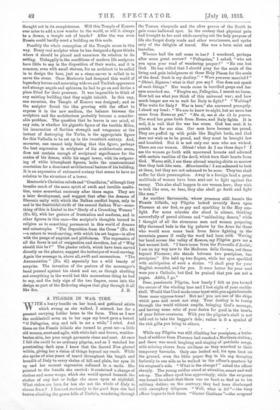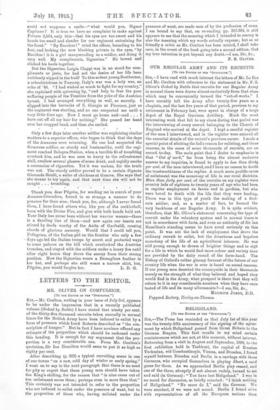A PILGRIM IN WAR TIME.
WITH a heavy bundle on her head, and gathered skirts which swung as she walked, I mistook her for a peasant carrying fodder home to the farm. Then as I saw the cockleshell sewn on to her cape my heart gave a bound. " 0 Pellegrina, atop and talk to me a while," I cried. And there on the Fiesole hillside she turned to greet me—a little old woman, erect and agile, with white hair and brown, weather- beaten skin, her poor rough garments clean and neat. At once I felt she could be no ordinary pilgrim, and as I watched her penetrating dark eyes I knew that the Sacred Fire glowed within, giving her a vision of things beyond my reach. While she spoke of nine years of travel throughout the length and breadth of Italy to every shrine of hill and plain, her eyes lit up and her earnest expression softened in a smile. She pointed to the bundle she carried: it contained a change of clothes and some wraps, which she would spread beneath the shelter of any but or hedge she mune upon at nightfall, What riches are hers, for has she not the whole of Italy to choose from P I listened enviously to the good days she lied known climbing the green hills of Umbria, wandering through
the Tuscan vineyards and the olive groves of the South to gain some hallowed spot. In the ecstasy that physical pain had brought to her soul while carrying out the holy purpose of life she forgot dusty roads and other wearinesses, and spoke only of the delights of travel. She was a born saint and traveller.
Whence had the call come to her P I wondered, perhaps after some great sorrow? "Pellegrina," I asked, " who set you upon your road of wandering prayer ?" "No one but God. He has willed that I should pray for the souls of the living and gain indulgences at these Holy Places for the souls of the dead. Such is my destiny." " Were you ever married P" " Ohimi, Signora ! what is that you say ? One does not speak of such things." Her words came in horrified gasps and her eyes scorched me. "Forgive me, Pellegrina, I meant no harm. Now tell me what you think of this universal war; and how much longer are we to wait for Italy to fight P" " Waiting P Who waits for Italy ? War is here," she answered promptly. I shook my head: " We are to know to-night, but no news has come from Rome as yet." "Ma .1, ma la she 0'e la guerra. The word has gone forth from Rome, and Italy fights. It is well, it is well that the war has come. God has sent it to punish us for our sins. Our men have become too proud. They are puffed np with pride like English lords, and God does not wish us to be proud, and they must be brought low and humbled. But it is not only our men who are wicked. There are our women. °hint. ! what do I see these days ? 'I see the women go forth with uncovered breasts and adorned with certain vanities of the devil, which turn their hearts front God. Worse still, I see them abroad wearing skirts so narrow that they look like men. Misericordia I I am ashamed to look at them, but they are not ashamed to be seen. They too shall suffer for their presumption. Away in a foreign land a great multitude of women have been sent out to fight against the - enemy. This also shall happen to our women here; they wish to look like men, ea bens, they also shall go forth and fight like men."
As another Savonarola, whose presence still haunts the Illesole hillside, my Pilgrim looked severely down upon Florence at our feet, so gay and sparkling in the May sun- light. For some minutes she stood in silence, thinking sorrowfully of proud citizens and "unblushing dames," while I thought of all the strenuous men and women preparing fifty thousand beds in the big palaces by the Arno for those who would soon come bank from fierce fighting in the mountain passes if really the word had been said. Waving her hand across the valley of flowers, my Pilgrim gave me a last earnest look. "I have 'come from the Poverello d'Assisi; 1 am on my way now to the Madonna della, Corona, out there beyond Florence; she stands between two precipices, two precipices." She held np two fingers, while her eyes sparkled with anticipation of such a shrine. "I shall pray for your English wounded, and for yon. It were better for your soul were you a Catholic, but God be praised that you are not a pagan. Addio, I go."
Dear, passionate Pilgrim, how lonely I felt as you turned the corner of the winding lane and I lost sight of your cockle- shell, Would that Ihad made some tryst with you again beneath these same cypress-trees I But nol you are one of the ships which pass and must not stay. Your destiny is to tramp through the world without respite, bringing God's message, and leaving some echo of your desire for good in the hearto of your fellow-creatures. With you the pilgrim's shell is not held out to take the beggar's dole ; rather is it a symbol of the rich gifts you bring to others.
While my Pilgrim was still climbing her precipices, a train. load of soldiers from Florence had reached a Northern station; and there was much laughing and singing of patriotic songs, with echoing cheers from civilians as they marched to their temporary barracks. Only one looked sad, his eyes bent on the ground, even the little paper' flag in his cap drooping forlornly to one side as he walked to the officer's quarters by his sergeant's side. "What is the charge ? " asked the officer sharply. The young soldier stood at attention, smart and well set-up. The officer eyed him approvingly, while the sergeant was bound to admit that there was no fault to find as to his military duties ; on the contrary, they had been discharged with exemplary diligence. " Well, what is it? "—the busy officer began to look fierce. "Signor Ceeitatto "—the.-sergeant could not suppress a smile—" what would you, Signor Capitano ? It is true we have no complaint to make against Private 2,561, only this—that his eyes are too sweet and his hands too small and slender for our regiment entraining for the front." "By Bacchus ! " cried the officer, bounding to his feet, and looking the now blushing private in the eyes, "by Bacchus ! it is a girl masquerading as a soldier, and doing it very well. My compliments, Signorina." He bowed and clicked his heels together. But the Signorina Luigia Ciappi was in no mood for com- pliments or jests, for had not the desire of her life been ruthlessly nipped in the buds To this ardent young Southerner, a schoolmistress in Tuscany, Italy's war was a holy war, an echo of '48. "I had wished so much to fight for my country," she explained with quivering lip, " and help to free the poor suffering people of the Trentino from the yoke of the Austrian tyrant. I had arranged everything so well, so secretly. I slipped into the barracks of S. Giorgio at Florence, just as the regiment was starting, and no one suspected me until a very little time ago. Now I must go home and—and . . have cut off all my hair for nothing." She passed her hand over her cropped head, and then she smiled.
Only a few days later another soldier was explaining similar matters to a superior officer, who began to think that the days of the Amazons were returning. No one had suspected the Genovese soldier, so sturdy and businesslike, until the regi- ment reached Bologna Station, when a terrible fit of trembling overtook him, and he was seen to hurry to the refreshment stall, swallow several glasses of some drink, and rapidly smoke a succession of cigarettes. Yet it was useless, for the truth was out. The sturdy soldier proved to be a certain Signora Gioconda Sirelli, a seller of chickens at Genova. She says that she means to try again, and that next time she will not be caught . . . trembling. • • • Thank you, dear Pilgrim, for sending me in search of your Amazon-Crusaders, forced in so strange a manner to do penance for their sins ; thank you, for, although I never found them, I have found others who, like you of the cockleshell, burn with the Divine Fire, and give with both hands held out. Your Italy has never been without her warrior women—there is a dazzling line of them—and now again our hearts are stirred by deeds worthy of the Anita of Garibaldi, rousing chords of glorious memory. Would that I could tell you, Pellegrina, of the Italian girl on the frontier who only a few days ago led the Italian troops by secret and protected ways to some palaces on the bill which overlooked the Austrian trenches, and stayed with the soldiers under a heavy fire until after eight hours they drove the enemy from their strong position. Now the Signorina wears a Bersagliere feather in her hat, and perhaps she still wears a narrow skirt, but, Pilgrim, you would forgive her, L. D. G.



































 Previous page
Previous page